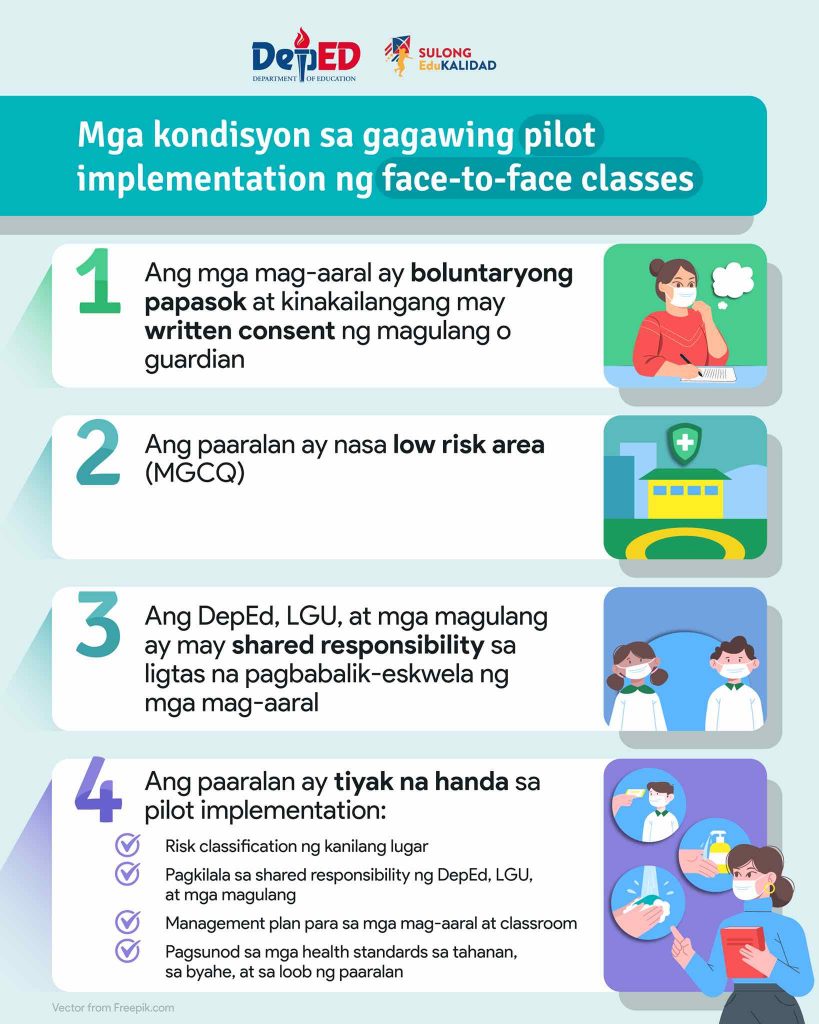ICYMI: A pilot run of the limited in-person classes will be held from Jan. 11 to 23, according to the Department of Education (DepEd), amid concerns from parents and teachers regarding safety, preparedness and accountability. President Rodrigo Duterte gave the plan a go signal this week.
But can students be forced to participate in this dry-run? No.
Attendance not compulsory
DepEd and Malacanang have been quick to assure parents that attendance in the limited in-person classes will not be compulsory. Under the department’s guidelines, a written consent signed by parents and guardians allowing their children to participate in the physical classes setup should be submitted before attendance.
Stringent health and safety standards at home, during travel to and from schools and within school premises will also be observed.
The education department has yet to announce the maximum number of students allowed per session, but said it will follow a staggered weekly schedule with reduced class sizes.
Only low-risk areas
Only areas classified as low-risk to COVID-19 will be allowed to participate in the pilot test, subject to DepEd’s approval.

The list of schools nominated to undergo the dry run in January will be submitted by DepEd regional directors by the end of this week. The schools will still be subject to validation and evaluation “with respect to the risk classification, documentation and acknowledgment of shared responsibility, students and classroom management plan and health standard requirements.”
The final list of schools will undergo “a thorough process of orientation, mobilization and readiness confirmation before the actual implementation from Jan. 4 to 8,” DepEd said.
Based on the outcomes of the Jan. 11-23 pilot run, recommendations will be sent to the President for further evaluation to decide whether physical classes will go on amid the uncertainty of a vaccine. The first COVID-19 vaccine manufactured by Chinese pharmaceutical company Sinovac is expected to be available locally by March 2021, according to National Task Force chief implementer Carlito Galvez Jr.
Concerned parents and teachers
Some parents have already expressed concern over the plan to “subject their kids to an experimental setup” without the assurance of a vaccine. While rich countries like the US, Britain and Canada have started rolling out the first doses of the vaccine, there has yet to be one specifically formulated for children.
“I will not allow my children to become subjects of an experiment conducted by strangers,” a single parent told Inquirer. “Why are they rushing the resumption of face-to-face classes?”
Some teachers are also skeptical about the plan. Raymond Basilio, Alliance of Concerned Teachers’ secretary general told Inquirer, “We have had enough of government orders that were not partnered with sufficient funding and ample preparations, as what had happened with distance learning where teachers and learners were ultimately left to fund [their] needs and fend for themselves.”
COVID-19 hotspots considered
More alarmingly, however, is the inclusion for consideration of some schools in localities in Region IV-A CALABARZON.
Rizal and Laguna on Monday were on the list of five provinces or cities with the highest single-day record of COVID-19 cases, according to Department of Health data. CALABARZON, however, trails the National Capital Region in terms of the number of active cases at 3,953 with new cases at 201, based on the latest health bulletin.
Header image courtesy of Inquirer
Get more stories like this by subscribing to our weekly newsletter here.
Read more:
Students and teachers are stressed about the new school year. Here’s how DepEd plans to help
These organizations are making online learning possible for more students
What I realized about online classes during a typhoon power outage